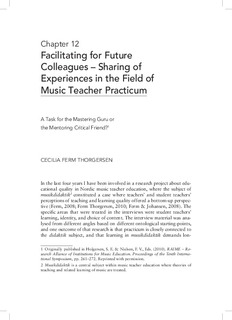Facilitating for future colleagues - Sharing of experiences in the field of music teacher practicum. A task for the mastering guru or the mentoring critical friend?
Chapter, Peer reviewed
Permanent lenke
http://hdl.handle.net/11250/172395Utgivelsesdato
2012Metadata
Vis full innførselSamlinger
- Artikler og bokkapitler [390]
Originalversjon
I: Educating music teachers in the new millennium, s. 207-218Sammendrag
In the last four years I have been involved in a research project about educational quality in Nordic music teacher education, where the subject of musikdidaktik constituted a case where teachers’ and student teachers’ perceptions of teaching and learning quality offered a bottom-up perspective. The specific areas that were treated in the interviews were student teachers’ learning, identity, and choice of content. The interview material was analysed from different angles based on different ontological starting-points, and one outcome of that research is that practicum is closely connected to the didaktik subject, and that learning in musikdidaktik demands longer periods and more relevant parts of practicum that are connected to the didaktik education. My interest in the combination of action and reflection, not at least in professional education, together with a common interest in how learning in and between different areas constitutes music teachers’ professional competence, and not at least curiosity about how practicum functions as a teaching subject, led to the development of the research project. To interview supervising teachers and student teachers, engaged in instrumental and classroom practicum, became a natural way of continuing the project. Teacher education is in continuous change and nowadays questions are common about what role practicum should play in teacher education, what learning should be encouraged there in what ways, and how it should be evaluated and by whom. At the same time syllabuses and other governing documents are changing as well as expectations from school leaders, pupils and parents. In other words, the everyday professional life of music teachers, where the practicum takes place, is a changing world. Therefore it is interesting to shed light on supervising in that area from a supervisor perspective. What are the stories about supervising future colleagues about? I believe such stories may be interesting and make up a basis for a nuanced discussion about what supervising in those situations may be like and what consequences different approaches may have for music teacher education and future music teachers. This paper will communicate the result of a narrative analysis of eight teachers’ stories about supervising music student teachers in practicum. The aim of the study was to illuminate, analyse and try to understand the stories about the function, task, and aim of supervising practicum in music teacher education from a life-world phenomenological perspective, through supervisors’ perceptions and experiences related to teaching and learning quality.
